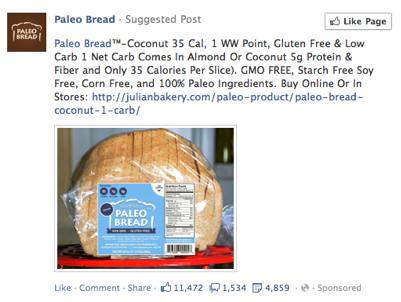So… the percentage of products actually bought online varies depending on who you ask and what items they include and exclude. Do plane tickets count? What about groceries? But a generally accepted estimate is somewhere in the 8 -10% range of retail purchases.
But at the same time, somewhere close to 90% of purchases are researched online, with research including articles, reviews, digital-mediate word-of-mouth, and more.
I bring this up because I had the exact experience lately. Julian Bakery has been advertising on Facebook a lot lately. Or, at least it seems like a lot to me, because I see their ads almost every time I jump on Facebook. Ads like this one:
And, really, that simple fact is sort of worth an article in and of itself, isn’t it? Because I’ve seen those ads a lot, I think they’re on EVERYONE’s Facebook or on Facebook in general, rather than assuming they were just on my page, specifically. Which is a pretty cool trick, from a branding perspective, don’t you think?
See, we generalize about online media in ways dictated by offline media. If you’re hearing a particular brands ads on the radio or TV, so is everyone else. But that simply doesn’t hold true for Pandora radio or Facebook does it? And yet, even though we know that intellectually, it doesn’t matter to how we process the experience emotionally. We still think an brand that bombards us with ads must be “worldwide” rather than targeting us specifically.
So the point I was making earlier was that I saw Julian Bakery’s ads for Paleo Wraps and Paleo bread and, rather than clicking on the ads, looked them up online to learn more. Then I checked to see if they were available through Amazon.com to read reviews and maybe order with fee shipping. No such luck.
But Julian Bakery’s Website DID sell me on their products and I was able to look up a local store that sold their Paleo Bread and Paleo Wraps. A day or so later, and I’m now the proud owner of two loaves of Paleo Bread and a pack of Paleo Wraps. Woohoo!
So according to their Web Analytics, those ads are likely failures, since I never clicked on the actual ads. But those ads ARE directly responsible for selling two loaves of bread and a pack of wraps. And that makes the ads operating under the branding-based model rather than the direct-response model.
And Facebook’s ability to saturate the media environment of targeted individuals (especially in the wake of in-the-newsfeed ads) makes it particularly compelling for niche products like Paleo Bread.
Good food for thought, don’t you think?



